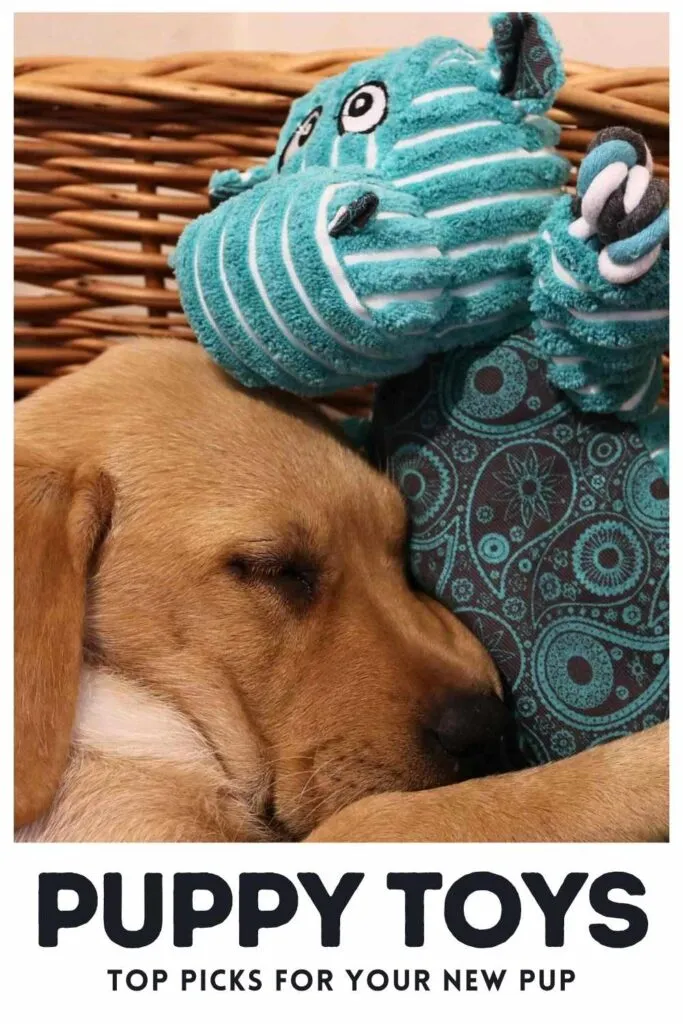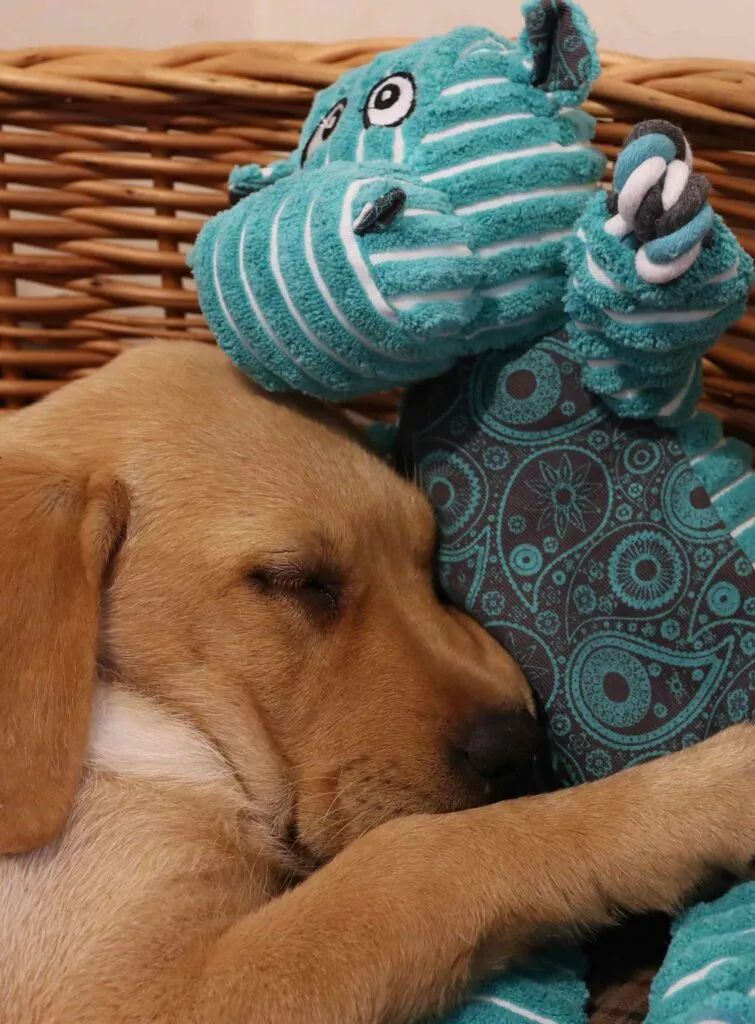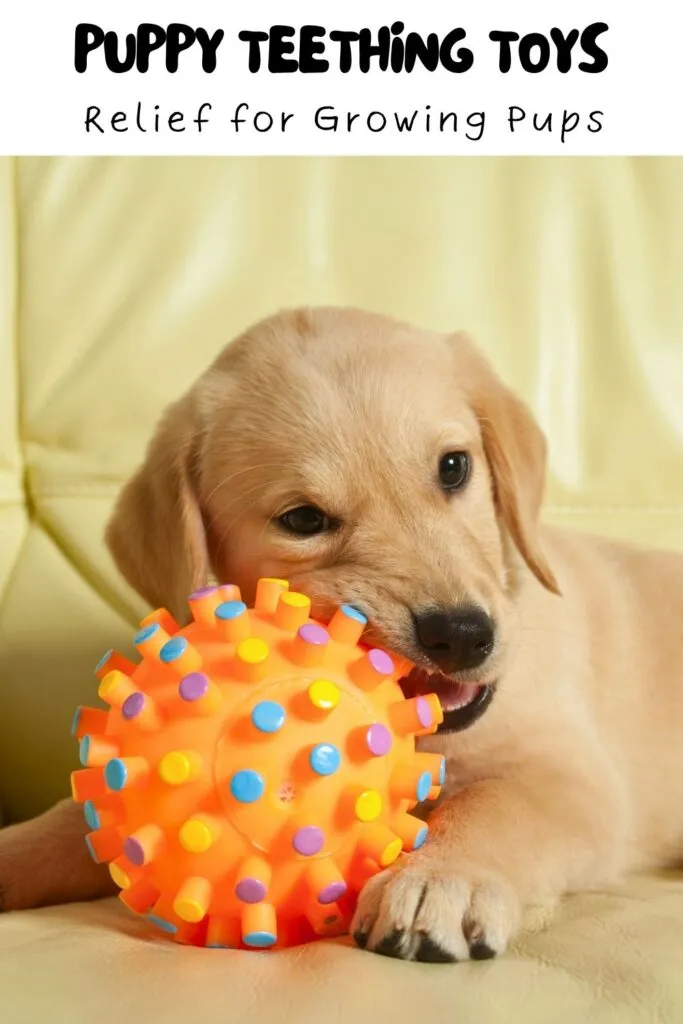Labrador puppies, known for their playful and energetic nature, require durable and safe chew toys, especially during their teething phase. Finding the Best Chew Toys For Teething Lab Puppies can be challenging, but it’s crucial for their dental health and overall well-being. This guide provides insights into selecting appropriate toys that can withstand a Lab puppy’s strong jaws while soothing their teething discomfort.
I will share which toys I choose for my puppies, focusing on their preferences and the toys’ durability against rigorous chewing. Many of the toys discussed are from Kong, a brand I trust for quality and longevity. I have no affiliation with Kong, and my opinions are based on years of experience.
Toys to Snuggle Up To
Soft toys are comforting for puppies, offering a sense of security. A teddy bear is often the first toy new owners purchase.
While no soft toy is indestructible, I’ve found the Kong range of soft toys to be more durable than most.
 Sleeping yellow Labrador puppy in a basket with a kong hippo toy
Sleeping yellow Labrador puppy in a basket with a kong hippo toy
Don’t expect soft toys to last forever; if a puppy still has theirs at six months old, that’s a win!
The Kong Wild Knots Range
The Kong Wild Knots range features toys with minimal stuffing and durable knotted ropes inside. These toys provide a satisfying chewing experience, reducing the urge to chew on inappropriate items.
These toys are excellent for puppies because of the internal knotted ropes. This provides a safer alternative to fully stuffed toys.
 Kong Floppy Knots Hippo for puppies
Kong Floppy Knots Hippo for puppies
My Lab puppy, Bonnie, enjoys the ribbed exterior of toys like the hippo and elephant from this line.
Kong Wubbas
Kong Wubbas are another durable soft toy option. Shaped like an octopus with canvas legs, they have a squeaky rubber ball in the head.
Kong Wubbas come in puppy and large sizes. While durable, the head is vulnerable. Remove the toy once breached, as the inner ball isn’t chew-proof. It is important to monitor your pet while they play with this to avoid them ingesting pieces of the toy.
Can You Stop a Puppy Destroying Their Plushies?
Kong teddies are cuddly and suitable for puppies to sleep with, though they may be less durable than the elephant or hippo toys. The lifespan of the toy depends on the dog.
Here’s how to reduce the risk of damage:
- Choose quality brands: Kong toys are more durable.
- Introduce toys early: Younger puppies are less destructive.
- Mend holes promptly: Repairing small holes can extend the toy’s life.
- Buy toys with minimal stuffing: Less stuffing reduces the risk of swallowing it.
Introduce Soft Toys as Soon as Possible
An 8-week-old puppy is less likely to destroy a soft toy than a 12-week-old one. Early introduction can lead to the puppy viewing the toy as a comforting companion rather than something to dismantle.
Mend Any Holes Promptly
Regularly inspect soft toys for small holes or tears. Promptly mending these can prevent the puppy from accessing and pulling out the stuffing, prolonging the toy’s lifespan.
Buy Toys with Minimal Stuffing
The chew toys for puppies under 3 months in the Kong Knots range are designed with minimal stuffing to reduce the risk of your dog pulling out the contents. These are a safer option for puppies.
Multiple Toys Can Help
Providing a variety of toys can help prevent a puppy from becoming overly focused on one particular item, which can lead to excessive chewing and faster destruction.
Why Bother with Soft Toys
Even though soft toys aren’t very durable, puppies need them to satisfy their chewing needs. They find chewing on softer items relaxing, taking pressure off their bedding.
It’s a similar sensation to chewing on the skin or sinew of prey animals.
When to Throw Soft Toys Away
Once a soft toy is torn, it’s no longer safe. Mend or discard damaged toys to prevent ingestion of stuffing.
Removing damaged toys also prevents the puppy from destroying others.
The Best Soft Toy for Puppies
I recommend the large Kong Knots elephant and teddy for Lab puppies. Bonnie, now six months old, still has hers in good shape since she was nine weeks old.
Tough Puppy Chew Toys
These toys are made for chewing and playing. Typically made of strong rubber, they are nearly indestructible. Older dogs enjoy these toys for years.
Puppies, however, may not be as interested in hard rubber toys unless engaged with or filled with food.
Bonnie’s favorites include the Kong red bone, Kong ring, and filled puppy Kong.
Why Some Puppies May Need Wood Chews
Puppies need different surfaces and textures to chew on. Some puppies prefer chewing on wood, which can be frustrating when they target furniture.
If your puppy chews baseboards, provide them with wooden chew toys. Tree root chews are made from tough, splinter-resistant tree roots. These durable chews provide hours of entertainment.
If your puppy enjoys chewing on furniture, a chew root toy will likely help.
The Risks of Chewing Harder Toys
Dogs can break their teeth, which is painful and costly. Dental surgery requires anesthesia, adding to the risk. Chewing hard objects may increase this risk.
Tooth fractures are common in dogs. Causes include playing, catching hard objects, and hunting. While peak age for fractures is older dogs, there is a risk to puppies chewing on harder toys.
Chew roots are also heavy and can hurt if dropped on toes.
Antlers and Bones
Antlers and bones are harder than wood chews. Vets are concerned about tooth fractures from these items.
Many vets recommend avoiding hard chew toys, suggesting toys with some ‘give’. The thumbnail test can differentiate hard toys from safer options.
I followed this advice but now provide antlers to my dogs due to a lack of effective alternatives.
Rubber chew toys often don’t appeal to dogs for long periods. Natural rawhide chews break up too quickly and can cause vomiting.
While older dogs play with rubber toys, they don’t chew on them for long. Puppies often show little interest. These aren’t alternatives to wood, antler, and bone.
So, does it matter if dogs don’t have anything hard to chew?
The Need to Chew
Chewing provides significant pleasure and relaxation for dogs. I consider recreational chewing a physical need.
My dogs eat a raw diet with bones, but still enjoy relaxing with an antler afterward. I want them to experience this pleasure.
Less Destructive Behavior
All puppies can be destructive, chewing on furniture and walls.
Frozen filled Kongs help, but the only way to completely prevent inappropriate chewing is constant supervision or crating.
Chewing on valued items like bones or antlers reduces inappropriate chewing and helps puppies relax. This is why I provide bones and antlers for recreational chewing.
This decision depends on your situation and your puppy’s behavior with toys. Try alternatives first and consult your vet.
Clean Teeth
Chewing bones and antlers can help clean teeth in dogs fed kibble.
A study showed that chewing bones reduced dental calculus by 88% in beagles after 20 days. I’ve seen this benefit in my dogs since switching to raw food.
Another option is brushing your dog’s teeth daily, but many owners don’t do this.
My Pick of the Best Puppy Toys
Here are my top five toy recommendations for new puppies:
- Kong Wild Knots Teddy (Large): Lightweight and easy for puppies to carry.
- Kong Wild Knots Elephant/Hippo: Durable with a satisfying texture.
 Yellow lab puppy chewing on an orange teething toy3. Kong Wubba Puppy: Great for interactive play.
Yellow lab puppy chewing on an orange teething toy3. Kong Wubba Puppy: Great for interactive play.
4. Tree Root Chew: Satisfies the need to chew on wood.
5. Original Kong: Fill with food and freeze for crate time.
Multiple Dogs and Puppy Toy Jealousy
If you have older dogs, be aware of toy jealousy. Dogs don’t share; toys are either ‘mine’ or ‘not mine’.
Don’t blame your dog for wanting the puppy’s toys. Buying them each one may help, but the older dog might want both!
Avoid a battle by keeping puppy toys out of reach in a playpen or crate. This allows the puppy to enjoy them undisturbed.
